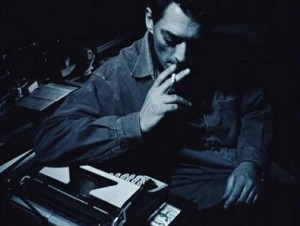 Last week I reported that Amy Sohn’s new book was out in bookstores. And now for something completely different. Park Slope’s elder literary statesman has a new book coming out
Last week I reported that Amy Sohn’s new book was out in bookstores. And now for something completely different. Park Slope’s elder literary statesman has a new book coming out
Did I just call Paul Auster an elder literary statesman?
Well, he is probably one of the best known authors in the neighborhood and certainly one of the most important in the world. Some of his books are considered the most influential books of the late 20th century. It must be said: the man has major cred.
On Tuesday, his new memoir, Winter Journal will be coming out. Today there’s an interview in Salon Magazine where he shares his thoughts on his work, writing and the political climate in America.
 He and Salon executive editor David Dailey met in Park Slope: “We met at a Park Slope cafe not far from his Brooklyn home on a recent rainy afternoon, where the conversation skipped easily from his new book to the New York Mets, and from literary politics to the presidential race,” Dailey writes.
He and Salon executive editor David Dailey met in Park Slope: “We met at a Park Slope cafe not far from his Brooklyn home on a recent rainy afternoon, where the conversation skipped easily from his new book to the New York Mets, and from literary politics to the presidential race,” Dailey writes.
The interview is very interesting and you should definitely read it. Auster talks about his decision to write another memoir. He’s already written three: The Invention of Solitude, the Red Notebook and Hand to Mouth. Now this one. Auster is only 64 and he looks wonderful when I see him on Seventh Avenue. It’s hard to believe that I’ve been seeing him in the neighborhood for twenty-one years, since he was in his forties.
Sure he looks a bit older now, but very dignified. He walks with the weight and intensity of someone who writes every day. He always looks lost in thought. Deeply. Every time I see him I wonder, what has he written today in his writing studio? In the Salon interview he talks about why he felt compelled to write this book:
“I don’t know. As I’ve said, I can never answer why. I wanted to do it, so I did it. Was it the idea of, you know, reaching the age I’ve reached? I don’t know. I’m not sure. I do know that, oddly enough, all these 40th anniversaries that were taking place in the last few years have been throwing me back to the old days a lot. I’ve been speaking about things that haven’t been preoccupying me a lot, and maybe haven’t spoken about. “Invisible” really goes back to Columbia in the late 1960s.
“So, you know, I’m living in the present, thinking about the past, hoping for the future. And then too, there’s another thing I’d like to say: Most of the time, the way I seem to generate books is to bounce off the one I’ve done before, so to negate it, to do the opposite, to reinvent it. The book that came before it [“Sunset Park”] is the first book that consciously I wrote in the now, capital “N,” and it was also immediate, all so much about our present moment, that the impulse was to go back afterwards.”
